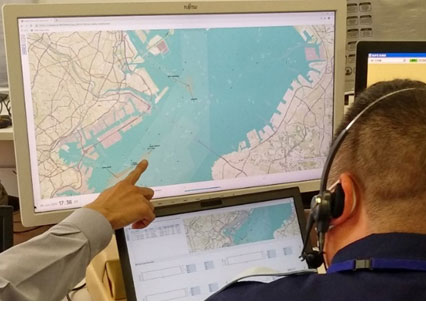This AI system can better control ship collision at sea than humans
When you talk about the application of artificial intelligence to self-driving technology, what do you think? Ebike? Self-propelled electric cars? Or a drone? Perhaps we should take a little more time to talk about the contributions that AI has made, and will make, to one of the very important areas: Maritime.
Huge cargo ships transport tens of billions of tons of cargo around the world each year, making them an important part of the global supply chain. Transporting goods on waterways is not easy, and it is even more difficult for large transport vessels to be full of cargo when crossing crowded sea routes. In the history of the maritime industry, there have been many serious accidents when large ships collided with each other, causing serious damage both in material and life.
To minimize the unfortunate accident when ships dock or cross the crowded sea routes, Fujitsu Technology Corporation (Japan) came up with the idea of using AI to control ship operation instead. for human.
In a test that lasted from December 2019 to March 2020, the Fujitsu Corporation and the Japan Coast Guard demonstrated the effectiveness of AI in controlling and preventing collisions between ships. operating or traversing the Tokyo Bay area.
Specifically, Fujitsu's AI-based collision control system called Zinrai is able to collect information about the ship's activities in real time and predict the ability to collide with high precision in the Gulf region. Tokyo, regardless of weather conditions. The company has added this technology to the Vessel Traffic Services systems used by the Tokyo port control authority, allowing them to better manage the movement of ships through the port.
 Data analysis to predict potential maritime collisions.
Data analysis to predict potential maritime collisions. As revealed by Fujitsu, Zinrai helps port managers to identify any potential collision situation 2 minutes faster than conventional systems commonly used today. Zinrai has issued nearly twice the number of warnings to captains of ships at high risk of collision compared to the old system. Moreover, this system is proven to be able to assess situations more accurately and consistently than the experience of the best management experts at Tokyo Port, greatly improving transportation activities. safe at sea.
According to statistics, only in the seas of Japan, there are more than 280 maritime collisions each year, causing great losses of life, material and adversely affecting the marine environment.
Minimizing collisions at sea isn't easy, but Fujitsu's AI system seems to be showing a step in the right direction. The Japanese port authority is currently planning to continue to support the development and application of this technology in practice.
You should read it
- ★ The horrific 'ghost submarine' disaster during World War I, the biggest maritime secret in history
- ★ Watching pictures painted by artificial intelligence, everyone thinks that is the work of a true artist
- ★ Artificial intelligence learns to create another artificial intelligence, replacing people in the future
- ★ 6 steps to start learning artificial intelligence programming (AI)
- ★ Concerns about artificial intelligence